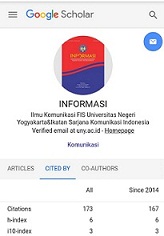KEEFEKTIFAN SEKOLAH, FUNGSI DAN MODEL
DOI:
https://doi.org/10.21831/informasi.v2i2.6198Abstract
School functions are created forthe learner's reproduction of
knowledge, attitudes, values, and techniques that have a culture. There are five types of school function: engineering/economic function, political function, human/social function, cultural function, and educational function. Each type of the school function operates at five levels (individual, institution, community, society, and international).
The effectiveness of a school is the capacity of the school to maximize its functions or the extent to which the school can perform the functions which consists of five types: technical/economic, human/social, political, cultural, and educational. The effectiveness of the school shows effective school performance in order to improve the quality of education. There are eight models of school effectiveness that places emphasis on each different aspect to the dynamic process of the school in an effective struggle for survival.
The models are: the model of destination; input source model; process model; satisfaction model; legitimacy model; ineffectiveness model, organizational learning model, and total quality management (TQM) models. In maximizing the school's function, school administrators can choose among the eight models of school effectiveness, in accordance with the interests, needs and condition of each school.
Keywords: Effectiveness, Function, Model
Downloads
Published
How to Cite
Issue
Section
Citation Check
License
Authors who publish with this journal agree to the following terms:
- Authors retain copyright and grant the journal right of first publication with the work simultaneously licensed under a Creative Commons Attribution License that allows others to share the work with an acknowledgement of the work's authorship and initial publication in this journal.
- Authors are able to enter into separate, additional contractual arrangements for the non-exclusive distribution of the journal's published version of the work (e.g., post it to an institutional repository or publish it in a book), with an acknowledgement of its initial publication in this journal.
- Authors are permitted and encouraged to post their work online (e.g., in institutional repositories or on their website) prior to and during the submission process, as it can lead to productive exchanges, as well as earlier and greater citation of published work (See The Effect of Open Access).












